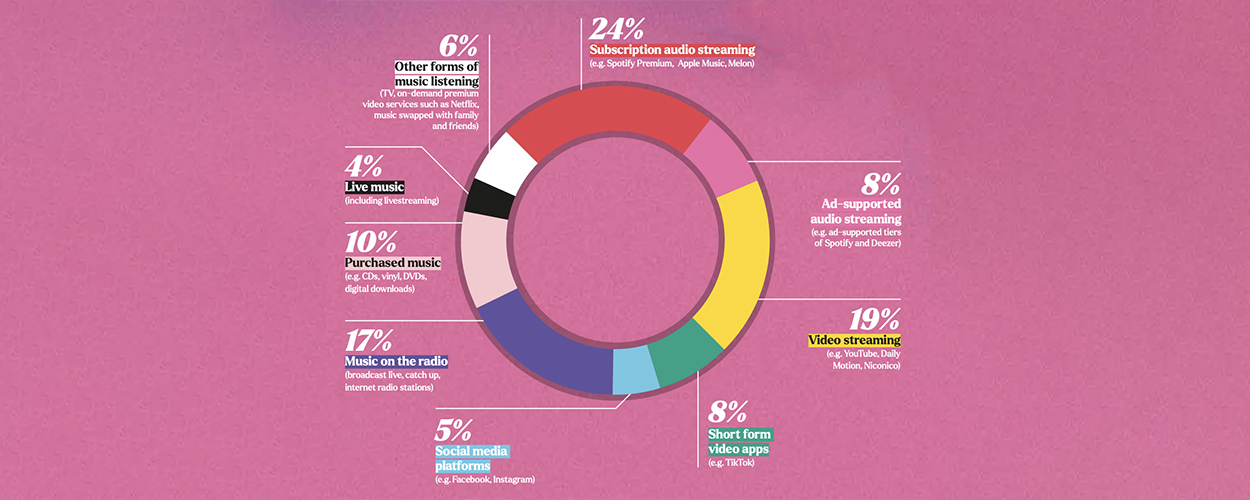
The key stories from the last week in the music business…
The International Federation Of The Phonographic Industry revealed that music consumption is at an all time high. That’s according to the global trade group’s latest ‘Engaging With Music’ report, based on a survey of 44,000 internet users around the world. Average listening time is up to 20.1 hours a week, from 18.4 hours in last year’s survey. Audio streaming services account for 32% of consumption, which breaks down as 24% premium streaming and 8% free streaming. Video and social media platforms also account for 32% of consumption, which breaks down as 19% on video platforms like YouTube, 8% on short-form video apps like TikTok and 5% on social apps like Instagram. And, the new report also reckons, the average person now engages with music via more than six different channels. [READ MORE]
Taylor Swift and Ticketmaster both issued statements after the latter’s platform struggled to cope with the demand for tickets for the former’s 2023 tour. Swift’s fans took to social media on Tuesday to complain about the various issues they were experiencing as tickets for ‘The Eras Tour’ went on pre-sale. Ticketmaster said that 3.5 million people registered via its Verified Fan system, of which 1.5 million were sent codes to access the pre-sale. That unprecedented demand - coupled with a “staggering number of bot attacks” also trying to access tickets - “disrupted the predictability and reliability” of the Verified Fan set up. Although that system did facilitate the sale of two million tickets, Ticketmaster admitted that, for many, the ticket buying experience was not good enough. Swift herself noted: “I’m not going to make excuses for anyone because we asked them, multiple times, if they could handle this kind of demand and we were assured they could”. [READ MORE]
The culture select committee in the UK Parliament held an update hearing following its inquiry last year into the economics of music streaming. The report that followed that inquiry called for a “complete reset” of streaming and MPs wanted to know what progress had been made since said report was published. They heard that the Intellectual Property Office had instigated three strands of work involving stakeholders from across the music community focused on data, transparency and creator remuneration. Work is ongoing to agree voluntary codes that could result in better management of rights data and more transparency about how the digital music business operates. However, artist and writer reps said that the least progress had been made around creator remuneration, which they consider to be by far the most important area where a “complete reset” is required. [READ MORE]
Drake and 21 Savage consented to a preliminary injunction secured against them by Vogue publisher Condé Nast. The media firm objected to the two musicians creating and distributing a fake Vogue cover as part of the promo for their new collaborative album ‘Her Loss’. So much so, it sued for trademark infringement, unfair competition and false advertising, among other things. As part of that legal action Condé Nast secured a speedy temporary restraining order prohibiting further distribution of the fake cover. That order was due to be discussed in court on 22 Nov, but a new legal filing this week confirmed that Drake and 21 Savage had stopped distributing the cover and had also consented to a preliminary injunction preventing further distribution from being in force. Meanwhile the wider trademark infringement lawsuit against Drake and 21 Savage will proceed. [READ MORE]
The launch of BBC Radio 1 Dance was discussed in court in London. The commercial radio sector, via its trade body Radiocentre, argues that before the BBC launched its standalone dance music service back in 2020 a full public interest test should have been conducted, which would have considered the impact of the new BBC service on commercially run dance music radio stations. However, the BBC reckons that - because Radio 1 Dance is only available within its BBC Sounds app, and simply aggregates and repurposes dance music content from elsewhere on the BBC radio networks - no such test was required, because the new service did not constitute a “material change” to its overall output. Media regulator OfCom agrees with the BBC. But Radiocentre says the regulator got it wrong and should have ordered the public interest test. As a result, Radiocentre launched legal proceedings against OfCom, with both sides presenting their respective arguments in court last week. [READ MORE]
This site uses cookies to enhance your experience - you can manage these in your browser settings.
CLICK ACCEPT to continue. CLICK HERE for full details on our privacy, data and cookies policy.
This website uses cookies so that we can provide you with the best user experience possible. Cookie information is stored in your browser and performs functions such as recognising you when you return to our website and helping our team to understand which sections of the website you find most interesting and useful.
Strictly Necessary Cookie should be enabled at all times so that we can save your preferences for cookie settings.
If you disable this cookie, we will not be able to save your preferences. This means that every time you visit this website you will need to enable or disable cookies again.